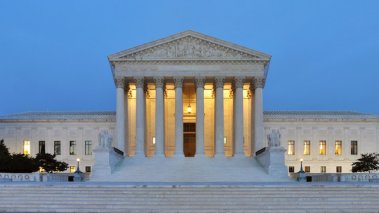Table of Contents
Arkansas professors petition Supreme Court for review of problematic tenure and dismissal policy

Joe Ravi / Wikipedia.org
For nearly four years now, FIRE has followed efforts by University of Arkansas System faculty to reform the system’s problematic revisions to its promotion, tenure, and dismissal policies. Having so far been unsuccessful at the federal court level, three professors have petitioned the Supreme Court to review their case in the hopes of protecting the procedural rights of faculty in the system’s 21 institutions.
The three professors — Philip Palade, Gregory Borse, and J. Thomas Sullivan — initially brought their federal suit over the new policies (reflected in UA system policy 405.1) in May 2019. A federal district court dismissed the lawsuit in March 2020, and a brief opinion from the United States Court of Appeals for the Eighth Circuit affirmed the decision. The faculty filed a petition for a writ of certiorari with the Supreme Court earlier this month after their motion for the Eight Circuit to hear their case en banc was denied.
What’s at issue with the new policy? As we wrote in late 2017, initial faculty concerns converged on the UA system’s proposed expansion of its definition of “cause” for disciplinary purposes to include a “pattern of disruptive conduct or unwillingness to work productively with colleagues.” FIRE, the Arkansas Conference of the American Association of University Professors, and numerous UA system faculty expressed concern that the expansive definition amounted to a new system-wide “collegiality” requirement for faculty, something that cuts directly against AAUP guidelines and threatens professors’ free expression rights.
FIRE urged the UA system’s board of trustees to reject the revised policy.
A new draft of the policy revisions presented in February 2018 removed that troublingly subjective portion of the policy’s language. FIRE viewed this as a step in the right direction, but remained concerned about how the new policy might be enforced in practice. As my colleague Mary Zoeller wrote in March 2018, “Given the wording of the original policy, FIRE acknowledges the possibility that the revised policy may be enforced by the administration in a way that deters faculty members from expressing dissent or disagreement.”
With that in mind, FIRE urged the UA system’s board of trustees to reject the revised policy. The board adopted the new policy, however, and it took effect on July 1, 2019.
As the faculty plaintiffs argued in their lawsuit, while the UA system made some changes to its draft policy language responsive to faculty input, the resulting policy nonetheless dramatically lowered the bar institutions must clear to discipline tenured faculty. The new policy significantly expanded the number of grounds (from four to twelve) that could give rise to discipline, including termination, for tenured and tenure-track faculty. What’s more, the professors argued, vague language in the new policy gave system institutions practically unfettered discretion to pursue discipline even outside these expanded grounds.
In the plaintiffs’ view, the expanded definition of “cause” in the new UA system policy was substantial enough to materially affect the terms and conditions of their employment. The faculty sought class-action status for all tenured and tenure-track faculty employed at UA system institutions before March 29, 2018 (the date on which the system trustees voted to adopt the new policy language), and sought to enjoin application of the policy to them, on the grounds that its adoption constituted a unilateral abrogation of contractually guaranteed rights. (Worth noting is that a legislative fix could well have avoided the need for this lawsuit. One state senator brought legislation explicitly exempting this class of faculty from being held to the new policy’s terms, but the effort failed.)
The case was dismissed by the district court on the grounds that the plaintiffs lacked standing to bring suit. The court held that the faculty had not demonstrated an injury-in-fact sufficient to show that they have standing, or in other words that they have grounds to challenge the new policy’s legality. The faculty argue — and they are now asking the Supreme Court to determine — that the policy changes themselves constitute sufficient injury to give standing for a legal challenge. They also contend that the Eighth Circuit’s affirmation of the lower court’s ruling creates a stricter standard for attaining standing, putting it at odds with other federal circuits. Importantly, they argue, this has significant implications for First Amendment and academic freedom rights. As they state in their petition:
[A]llowing universities, or any other public institution, to freely modify contracts over the objection of the counterparty – and especially contracts that create protected property interests – creates a breathtaking opportunity for abuse and oppression by public bodies. Most especially, the ability of a faculty member to speak openly and freely in the academic setting concerning fundamental and controversial issues, topics, and ideas, without fear of termination, is at the very core of what is protected by the First Amendment. If the professors do not have standing to seek a judicial remedy when such imperative constitutional rights are restricted, then their only options are to either conform to what a university administration deems acceptable speech or risk their careers by engaging in speech deemed unacceptable.
The professors’ concern is a serious one. Only a small percentage of cert petitions are granted review by the Supreme Court, but we hope the professors are given the chance to make their case. If they aren’t, then mounting a successful legal challenge will likely require a case from a professor who can demonstrate that they were wrongly punished under the policy. We hope no faculty member has to pay that high a price to give this policy — the adoption of which FIRE repeatedly discouraged — the interrogation it deserves.
Recent Articles
FIRE’s award-winning Newsdesk covers the free speech news you need to stay informed.

BREAKING: New Title IX regulations undermine campus free speech and due process rights


Stanford president and provost cheer free expression in open letter to incoming class
